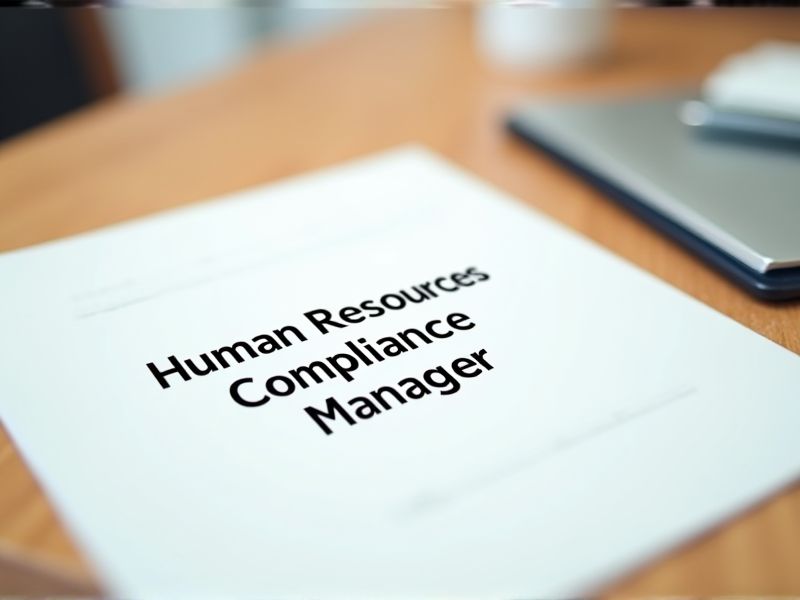
Human Resources Compliance Managers oversee adherence to complex regulatory frameworks and organizational policies. Obtaining certifications ensures they possess the necessary expertise to navigate evolving legal landscapes. Certifications validate a professional's capability to enforce compliance standards and manage risk effectively. Here are some crucial certifications you might need as a Human Resources Compliance Manager.
SHRM-SCP
Holding the SHRM-SCP credential equips Human Resources Compliance Managers with advanced knowledge in managing complex HR functions and aligning organizational objectives with regulatory standards. This ensures that they can effectively oversee and implement compliance initiatives that reduce legal risks and uphold ethical practices. A SHRM-SCP designation signifies an understanding of global HR trends, which is crucial in adapting corporate strategies to rapidly evolving compliance landscapes. Managers with this certification demonstrate a commitment to professional growth and credibility, which is essential for maintaining trust with internal and external stakeholders.
SHRM-CP
SHRM-CP certification ensures that a Human Resources Compliance Manager possesses up-to-date knowledge of employment laws and regulations. This certification verifies a manager's understanding of best practices in HR, which can mitigate legal issues and non-compliance risks. Employers recognize SHRM-CP as evidence of a professional's competency in aligning HR strategies with organizational goals. Achieving SHRM-CP can enhance a manager's ability to develop effective compliance programs and policies.
HRCI SPHR
Possessing the HRCI SPHR certification demonstrates a strong understanding of strategic HR policies, essential for navigating complex compliance landscapes. The certification enhances a Human Resources Compliance Manager's credibility, crucial when enforcing industry and legal standards. HRCI SPHR equips professionals with the latest knowledge in risk management, reducing potential compliance-related liabilities. Organizations often regard this certification as a benchmark, influencing hiring decisions and career advancement for HR professionals.
HRCI PHR
Holding an HRCI PHR certification enhances a Human Resources Compliance Manager's credibility and expertise in navigating complex labor laws and regulations. The certification provides a standardized knowledge base, ensuring the manager is well-equipped to implement compliant HR practices. It also signals commitment to professional development, which can strengthen trust within the organization. Improved competencies in risk management and policy application can reduce the organization's vulnerability to legal issues.
GPHR
The GPHR certification provides a comprehensive understanding of global HR practices, essential for a Human Resources Compliance Manager tasked with navigating international regulations. Its focus on diverse legal requirements helps mitigate legal risks associated with global employment practices. This certification equips managers with skills to develop policies that adhere to complex international labor laws. By holding the GPHR, a Compliance Manager demonstrates commitment to ethical standards and regulatory proficiency in the global HR landscape.
Certified Compensation Professional (CCP)
A Certified Compensation Professional (CCP) has specialized expertise in designing and managing competitive compensation strategies, ensuring organizations maintain equitable pay structures. This certification provides the HR Compliance Manager with the knowledge to align compensation plans with regulatory requirements, minimizing legal and financial risks. Expertise in compensation assists in crafting policies that comply with labor laws and industry standards, promoting fair compensation practices. A CCP enhances an organization's ability to attract and retain talent by maintaining compliance with compensation-related regulations.
Certified Employee Benefit Specialist (CEBS)
Human Resources Compliance Managers need a Certified Employee Benefit Specialist (CEBS) qualification to ensure they have comprehensive knowledge of complex employee benefits legislation. The CEBS certification provides in-depth understanding of benefits policies and regulations, which helps in mitigating compliance risk in the organization. These managers are responsible for aligning company benefits with legal standards, and CEBS training equips them to do so effectively. With changing laws and regulations, a CEBS certification ensures managers remain adept at navigating the latest compliance challenges.
Certified Compliance and Ethics Professional (CCEP)
Obtaining the CCEP designation equips HR Compliance Managers with specialized knowledge in regulatory standards and ethical practices, enhancing their ability to navigate complex legal landscapes. This expertise reduces organizational risk related to non-compliance, as it fosters a culture of adherence to rules and ethical standards. Recognized certification like CCEP validates the manager's skills, boosting credibility and trust within the organization. It also aids in staying updated with evolving laws and regulations, which is crucial for implementing effective compliance strategies.
Certified Fraud Examiner (CFE)
A Certified Fraud Examiner (CFE) brings specialized skills to detect and prevent fraud, which is essential for ensuring a company's compliance with all regulatory standards. Human Resources Compliance Managers benefit from a CFE's expertise by strengthening internal controls and creating a more transparent work environment. The CFE's knowledge helps in developing robust policies and procedures, minimizing the risk of financial and reputational loss. Companies can also see improved employee trust and organizational integrity, contributing to overall business success.
Certified Risk Management Assurance (CRMA)
Certified Risk Management Assurance (CRMA) enhances the Human Resources Compliance Manager's ability to identify and evaluate potential risks within the organization effectively. HR regulations and policies are complex and constantly evolving, requiring professionals to possess advanced skills in risk assessment and compliance. Certification in risk management provides compliance managers with structured frameworks to implement robust internal control systems. CRMA credentials signal expertise and credibility, increasing trust from stakeholders and ensuring alignment with global compliance standards.
Summary
You will likely observe enhanced efficiency in managing and interpreting labor laws and regulations. Certifications equip the HR Compliance Manager with advanced knowledge and skills, leading to more effective compliance frameworks. An improvement in risk management and a reduction in legal liabilities can also be anticipated. Consequently, organizational trust and credibility are expected to increase within regulatory bodies and among employees.
